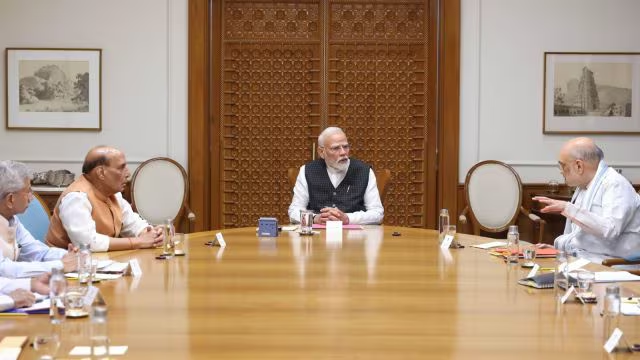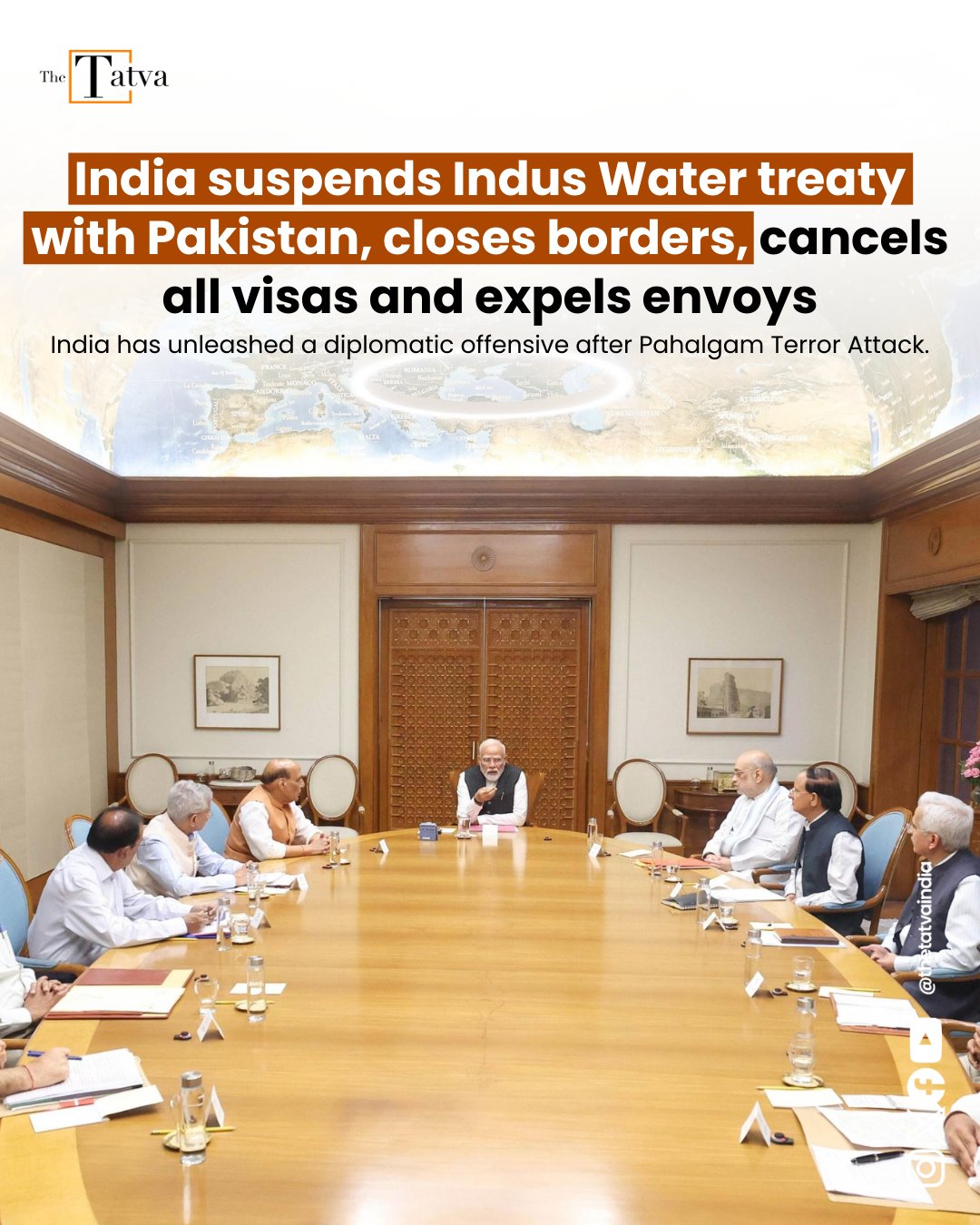CCS “resolves that the attackers will be held accountable and their sponsors brought to justice.”

India put the Indus Waters Treaty on hold Wednesday, cut diplomatic ties with Pakistan by half, expelled diplomats and top defense officials from the Pakistan High Commission in Delhi, cancelled all visas granted to Pakistani nationals under a SAARC scheme and ordered them to leave within 48 hours, and closed the Attari-Wagah border, all while highlighting “the cross-border linkages of the terrorist attack” near Pahalgam that claimed 26 lives.
Also Read : pahalgam terror attack news in english : April 24, 2025
Additionally,it removed its own employees and consultants from its mission in Islamabad.
Delhi is launching its most extensive diplomatic reprisal since 2019,when its diplomatic force was cut in half,from 110 to 55. It has now been further lowered to thirty. After Article 370 was repealed,Pakistan took the initiative to remove the High Commissioners in 2019,and India soon followed.
Foreign Secretary Vikram Misri told reporters Wednesday that Prime Minister Narendra Modi chaired the Cabinet Committee on Security (CCS),which convened in the evening. National Security Advisor Ajit Doval, Home Minister Amit Shah, Defense Minister Rajnath Singh, External Affairs Minister S Jaishankar, Cabinet Secretary, and Secretaries of the Home, Defense, Finance, and External Affairs ministries were present.

The terrorist incident in Pahalgam on April 22, which claimed the lives of 25 Indians and one Nepali national, was thoroughly explained to the CCS. There were several others hurt. The CCS extended its heartfelt condolences to the victims’ families,strongly denounced the act,and wished for the injured to recover quickly,”he said.
Numerous governments worldwide have sent strong messages of solidarity and support,categorically denouncing this terrible attack. He stated,”The CCS documented its gratitude for such sentiments,which reflect zero tolerance for terrorism.”
The cross-border connections of the terrorist act were highlighted in the briefing given to the CCS. It was observed that this incident followed the Union Territory’s successful elections and consistent advancements in economic development and growth,”he stated.
According to Misri,the CCS identified five punitive actions and decided on the following measures in recognition of the terrorist attack’s seriousness.
First, “until Pakistan credibly and irrevocably renounces its support for cross-border terrorism,the Indus Waters Treaty of 1960 will be held in abeyance with immediate effect.”
After surviving three wars and terrorist assaults,including the 2008 Mumbai 26/11 and the 2019 Pulwama,India had already started the process of rescinding the Indus Waters Treaty.
India formally requested a “review” of the Indus Water Treaty from Pakistan on August 30 of last year. In accordance with Article XII(3) of the convention, the notice was sent. India had already sent Pakistan a notice to amend the pact in January 2023. Compared to the 2023 notice, the 2024 review notice was a level higher and qualitatively different.
They have now made the decision to revoke it and condition it on Pakistan’s response to the terrorist infrastructure.
Secondly,the Integrated Check Post Attari would be shut down immediately, according to Misri. Before May 1,2025,those who have crossed over with legitimate endorsements are permitted to do it again. This will affect Pakistani nationals and businesspeople who have crossed the Wagah border on foot to reach India. Medical patients will be included in this. A week has been allotted to them.
Third,”Visas under the SAARC Visa Exemption Scheme (SVES) will not allow Pakistani nationals to enter India.” Any previous SVES visas granted to citizens of Pakistan are considered revoked. He stated that any Pakistani national who is in India on an SVES visa has 48 hours to depart the country.
In 1992,the SVES was introduced. At the Fourth Summit (December 29–31, 1988) in Islamabad,the leaders recognized the value of interpersonal interactions between the peoples of SAARC nations and decided that some types of dignitaries should be granted a special travel document that would exempt them from regional visa requirements.
The list of eligible groups was periodically reviewed by the Council of Ministers in accordance with the Summit’s directives. There were now 24 categories of eligible individuals on the list,including dignitaries,higher court judges,lawmakers,senior officials,businesspeople,journalists,and athletes.
The corresponding Member States issue Visa Stickers to the eligible groups in that nation. The Visa sticker typically has a one-year validity period.The SAARC Member States’ Immigration Authorities conduct periodic reviews of the implementation.
“The Defense/Military,Naval,and Air Advisors in the Pakistani High Commission in New Delhi are declared Persona Non Grata,”Misri stated in his fourth statement. They can depart India in a week.The Indian High Commission in Islamabad will no longer have its own defense,navy,and air advisors. These positions are considered revoked in their respective High Commissions. Additionally,five of the Service Advisors’ support workers will be removed from both High Commissions.
Since they were considered to be official lines of contact between the two nations’ armed forces and intelligence services,this is a big move.
Fifth,he stated that by May 1,2025,”the overall strength of the High Commissions will be reduced to 30 from the present 55 through further reductions.”
This would include the 17 more ambassadors and their staff as well as the expelled defense services officials and workers. The missions in Delhi and Islamabad will have skeletal staff as a result of this nearly 50% reduction in manpower.
According to Misri,”the CCS directed all forces to maintain high vigil after reviewing the overall security situation.” It decided that the attack’s perpetrators would face consequences and their sponsors would be held accountable. India will continue to pursue individuals who have carried out acts of terror or plotted to enable them,as demonstrated by the recent extradition of Tahawwur Rana.
New Delhi considered a number of options before making the diplomatic decision in the face of the biggest terror attack on civilians in the nation since the 26/11 attacks.
According to sources, the administration has already employed coercive diplomacy, particularly after the events of 26/11 and the Pulwama terror attack in 2019, which included shaming and condemning Pakistan internationally. This will involve bringing up the matter with the UN (Security Council and other UN bodies),briefing foreign ambassadors stationed in Delhi,briefing foreign ministries through Indian posts abroad,and dispatching special envoys to brief other governments.
According to sources,the government is also considering additional options,such as kinetic options,which involve military action. According to the sources, “all options are on the table.”
